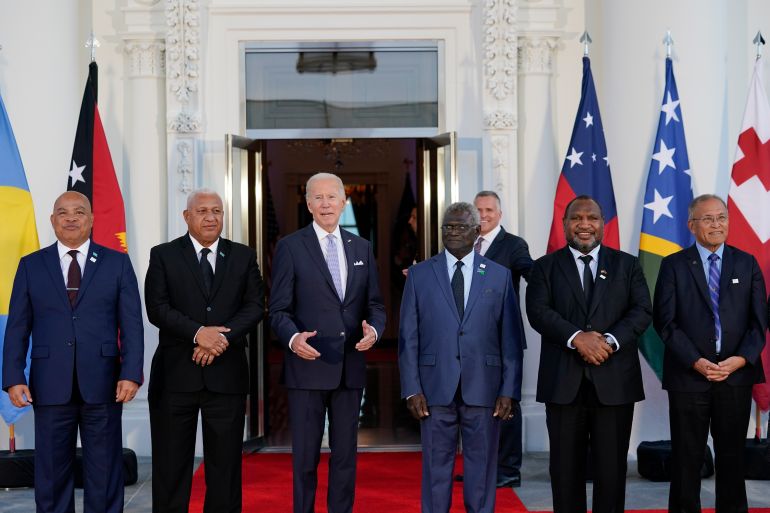US, Micronesia deepen political and economic ties
Deal is likely to be a blow to China, which has made a concerted effort to increase its influence in Micronesia.

The United States has reached a deal with Micronesia to extend decades-old political and security ties, as China attempts to build influence in the region.
State Department officials said on Wednesday that three documents related to Micronesia’s Compacts of Free Association (COFA) with the United States had been signed in Pohnpei, signalling the extension of a 20-year-old arrangement that gives the island nation defence and security guarantees, and Washington the right to locate military facilities across a swath of the central Pacific.
Keep reading
list of 4 itemsUS, PNG sign defence pact as Washington aims to counter China
‘Symbol of renewal’: US reopens Solomon Islands embassy
China-sceptic leader of Solomon Islands largest province removed
The signing marked “the successful conclusion of negotiations with FSM regarding the extension of compacts-related economic assistance” and was “a major milestone” in relations, the State Department said in a statement.
The signing of the agreements will be a blow to China, which has made a concerted effort to increase its influence in Micronesia, prompting unease among some local politicians.
Then-president David Panuelo in March accused China of engaging in bribery, harassment and espionage as it tried to boost its influence.
Beijing, he told parliament, had “demonstrated a keen capability to undermine our sovereignty, rejects our values, and uses our elected and senior officials for their own purposes”.
Among the dramatic allegations, Panuelo claimed his cabinet colleagues transmitted recordings of bilateral meetings directly to China, and officials were bribed.
“We are bribed to be complicit and bribed to be silent. That’s a heavy word, but it’s an accurate description regardless,” he said.
US talks on the compacts have been taking place for years, alongside similar agreements with neighbouring Palau and the Marshall Islands.
A renewal agreement with Palau was announced on Monday, but talks with the Marshall Islands have been more difficult because of the legacy of nuclear weapons testing on the Pacific archipelago more than 70 years ago.
The United States detonated 67 nuclear bombs in the Marshall Islands between 1946 and 1958, and the health and environmental effects are still felt today.
Marshall Islands negotiators first want the United States to pay more of the compensation awarded by the international Nuclear Claims Tribunal, totalling just over $3bn, of which about $270m has been paid so far.
Taylor Ruggles, the US State Department’s Pacific Island Affairs director, said on Wednesday that talks with the Marshall Islands were “advancing”.
“Clearly the renewal of the compacts is important for the administration,” said Ruggles, adding that the agreements still have to be “funded and approved” by the US Congress.
He described Micronesia, Palau and the Marshall Islands as “some of our closest partners in the Pacific”. The Marshall Islands agreement expires at the end of 2023.